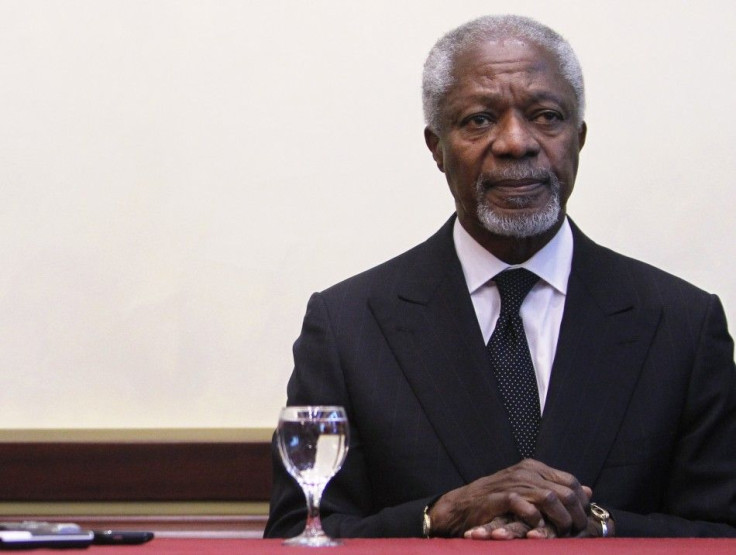With Kenya On Edge Ahead Of Pivotal Election, Kofi Annan Steps Into The Fray

Months after giving up his failed mission as a go-between in the intractable Syrian conflict, Kofi Annan has ventured into a whole new powder keg. This time, it’s Kenya, where a tense presidential election threatens to erupt into deadly violence early next year.
This isn’t Annan’s first time playing a decisive role in Kenyan politics. But if presidential candidate Uhuru Kenyatta has his way, it could be his last.
Annan, a former U.N. secretary-general who hails from Ghana, brokered a peace deal for Kenya in 2008, after the disputed election erupted into a bloody ethnic dispute that killed more than 1,000 people and displaced hundreds of thousands more. That vote resulted in a controversial second term for President Mwai Kibaki, and Annan was involved in the negotiations that saw Kibaki’s rival, Raila Odinga, become prime minister in a shaky power-sharing agreement that persists to this day.
In March 2013, another presidential election is due; Kibaki cannot run again. As this deeply divided country braces itself for the possibility of new violence, Annan hopes that Kenyans will heed his warning: He has called on voters to reject politicians who have been indicted by international courts for crimes against humanity.
“When you elect a leader who cannot [interact freely with other international diplomats], who will not be free or will not be easily received, it is not in the interests of the country and I'm sure the population will understand that,” he said, according to the BBC.
Annan did not name names, but the reference is clear; Kenyatta was formally charged by the International Criminal Court in January.
The roots of this controversy are deep and complex, owing to the power of tribal loyalties that often take precedence over political affiliations.
Kenyatta, a political heavyweight whose father Jomo Kenyatta was the founding father and first president of modern Kenya, represents The National Alliance, or TNA. The party was formed in May of this year, essentially functioning as a vehicle for Kenyatta’s election although it claims to represent Kenya’s youth and proclaims a vision of national unity.
In March of next year, he’ll be facing off against Odinga, who represents the Orange Democratic Movement, or ODM, which coalesced in 2005 to oppose a constitution that would have granted sweeping powers to the presidency.
Kenyatta was soundly defeated by Kibaki in the 2002 elections. (At that time, Odinga supported Kibaki, though the two are now rivals.)
The next elections, in 2007, saw Kibaki and Odinga – once staunch allies who had a falling out over constitutional changes – go head to head. That election stirred up deep-seated tribal animosities in the country; Kibaki represents the Kikuyu tribe, which has been accused of monopolizing politics in Kenya. (Kenyatta, also a Kikuyu, supported Kibaki.)
Both sides played dirty during that pivotal campaign, using fiery rhetoric to stir up ethnic rivalries and rile up voters. It backfired after the election, when deadly violence rocked the country.
The ICC has since accused Kenyatta of inciting much of that bloodshed. It has done the same for his chosen deputy in this campaign, William Ruto. The latter was on the other side of the divide in 2007 – he supported Odinga.
Ruto and Kenyatta joined forces in late November, appearing together in a jubilant ceremony in Nakuru, one of the cities worst affected by violence in 2008.
Today, Odinga still enjoys a slight lead in the polls – but Kenyatta has been gaining support more quickly. It is gearing up to be a closely fought race, which is bad news in a country where electoral animosities can turn deadly.
Annan has been criticized – mostly by Kenyatta supporters – for offering advice in this tense electoral season. But he has assured critics that his interference is well-intentioned.
“I am sure most Kenyans are hoping for free and fair elections and we as friends and people of goodwill … and there lots of goodwill to the people of Kenya in the outer world would want to see this happen,” he said, according to Kenyan news outlet Capital FM. “That is what has kept us engaged in the process over the years, and that is what we are here to encourage as we move towards March 2013.”
© Copyright IBTimes 2024. All rights reserved.






















